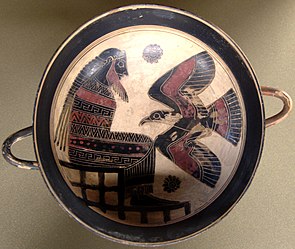Great Rhetra
| Sparta |
 Zeus on his throne with his eagle This article is part of the series: |
|
Great Rhetra Laws of Lycurgus Politeia |
|---|
|
List of Kings of Sparta Gerousia Ephorate Apella of the Damos Spartiates Perioeci Helots Agoge Syssitia |
|
Spartan army • Other Greek city-states • |
This article is part of the series:
Spartan Constitution
The Great Rhetra (Greek: Μεγάλη Ῥήτρα, literally: Great "Saying" or "Proclamation", charter) was used in two senses by the classical authors. In one sense, it was the Spartan Constitution, believed to have been formulated and established by the legendary lawgiver, Lycurgus. In the legend Lycurgus forbade any written constitution. It was therefore presumed to have been oral.
In a second sense, the rhetra refers to an oracle of Delphi, which was believed to have contained the entire constitution in verse. The credo of being unwritten fails in this case, as a written record of all oracles was maintained by the priests at Delphi. They and others consulted it frequently. It survived long after the demise of the oracle but is missing now, except for fragments handed down by classical authors.
The classical authors and the literate population of Sparta knew better than to suppose that the rhetra went into effect as written by an oracle and remained unchanged. A double tradition developed: tales of the oracular rhetra and stories of the laws of Lycurgus. As there is no history of any constitutional issues dividing the Spartans, they seem to have had no problem accepting its contradictions, perhaps because they knew it was legendary.
Also, the concept of the constitution being truly oral and a state secret presents certain paradoxes, such as how the classical authors knew so much about it. Moreover, the workings of the government of a major Greek state over centuries cannot have been either unwritten or a secret. For example, Cyrus the Younger knew perfectly well that Lysander was forbidden by law to hold a second term as navarch, and yet he requested the Spartan government to make an exception. And finally, if the Spartans were forbidden to write anything down, the existence of inscriptions in the Eurotas valley becomes problematic. The institution of the rhetra in fact coincides with the innovation of the Greek alphabet based on the Phoenician alphabet.
According to Herodotus, at some time before the reigns of Leon of Sparta and Agasicles, the Spartans "had been the very worst governed people in Greece." Lycurgus, "a man of distinction among the Spartans," decided to ask advice of the Delphic oracle. On reaching the inner sanctum of the temple, he heard:
...
Wikipedia
